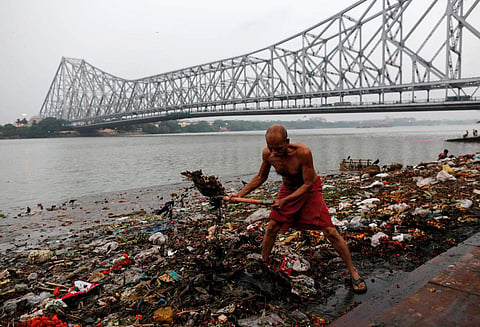

The world has been on lockdown for weeks now and the Coronavirus pandemic has affected more than 18 lakh people till date. While nature seems to have got lucky with the reset button with the air quality improving and animals roaming freely, the environmentalists are also worried that the pandemic is a result of over-exploitation of natural resources and putting too much pressure on nature. Priyanshu Kumath, the founder of Clean Water, an organisation dedicated to finding a sustainable solution for restoration of water bodies, says that we need to be very careful of what we do next in order to prevent another outbreak.
The continued depletion of the wilderness has got us very close to the animal and plant kingdom and this, the experts say, has brought us very close to diseases that can easily be transmitted from animals to humans. "Scientists found traces of the Coronavirus at a water treatment plant in Amersfoort on March 5, before any cases had been reported in this city in the Netherlands. This report got me thinking. What if any of our major rivers get polluted by this virus? There are millions who are dependent on River Ganga and Yamuna — a lion's share of our population is dependent on the major rivers for their water consumption. Imagine what will happen if our rivers get affected," says Priyanshu. "The viruses — be it SARS, Ebola, MERS, Zika or the Coronavirus — we are dealing with right now are coming back stronger every year. If COVID-19 could make the whole world stop and lock themselves in, we cannot even begin to imagine what catastrophe the next major virus would bring with it. It might be as deadly as SARS-CoV and as infectious as the SARS-CoV-2 (the one that causes COVID-19)," he adds.
Leading scientists also believe that the novel Coronavirus outbreak is a clear "warning shot” as far deadlier diseases exist in the wild and we are very close to that. "It was almost always the case that our actions are those that cause diseases to spill over from the animal world into ours. The animal market in Wuhan, from where the virus had supposedly originated, is the right example to explain the problem. We are bound to be exposed to viruses and pathogens that are not known to us if we keep encroaching into the wild, eating wild animals and pushing them so far that they come in direct contact with the human world," says Priyanshu. To prevent further outbreaks, experts from all over the world have the same suggestion — global heating and exploitation and destruction of natural resources have to end, as both of these drive wildlife into human contact.
It is thus imperative that we take preventive measures today and stop the next major epidemic from occurring, says Priyanshu. "Polluted water bodies are a common occurrence in developing countries. These are breeding grounds for all kinds of pathogens which may cause the next major epidemic. When waterborne epidemics arrive and make the entire water in a city unfit for consumption, the governments might not have any other option but to vacate entire cities. Where will these people go? Where will they live? How would they be relocated? What would be the number of deaths in the process? What would be the loss financially? What quantum of efforts would go into controlling this virus? What about the cities downstream?" Priyanshu asks.
Like Priyanshu, there are many who are worried that we are pushing it too far. The UN’s environment chief, Inger Andersen, recently told The Guardian that nature is sending us a message — from the Corona pandemic to the Australian bushfires. “There are too many pressures at the same time on our natural systems and something has to give,” she tells The Guardian. “We are intimately interconnected with nature, whether we like it or not. If we don’t take care of nature, we can’t take care of ourselves. And as we hurtle towards a population of 10 billion people on this planet, we need to go into this future armed with nature as our strongest ally,” she adds.
